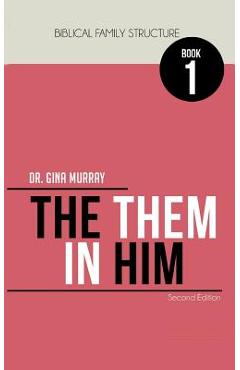Biblical Family Structure Book One: The Them in Him - Gina Murray

Detalii Biblical Family Structure Book One:
libris.ro
133.85 Lei
148.72 Lei
Religion
Gina Murray
Biblical Family Structure Book One: - Disponibil la libris.ro
Pe YEO găsești Biblical Family Structure Book One: de la Gina Murray, în categoria Religion.
Indiferent de nevoile tale, Biblical Family Structure Book One: The Them in Him - Gina Murray din categoria Religion îți poate aduce un echilibru perfect între calitate și preț, cu avantaje practice și moderne.
Preț: 133.85 Lei
Caracteristicile produsului Biblical Family Structure Book One:
Comandă Biblical Family Structure Book One: Online, Simplu și Rapid
Prin intermediul platformei YEO, poți comanda Biblical Family Structure Book One: de la libris.ro rapid și în siguranță. Bucură-te de o experiență de cumpărături online optimizată și descoperă cele mai bune oferte actualizate constant.
Descriere magazin:
The Them In Him, the first volume the Biblical Family Structure series, consists of four essays and an extensive appendix, drawn from the treasure trove of the author s personal notes written in the margins of Bibles, on the back of worship service programs, and during family scripture study. A clear view of the Biblical institution of marriage emerges from the coherent discussion, led by the author, as she articulates it in terms of its function which is first outlined as the Natural Law of Genesis and further developed as a theme through Mosaic Law and expounded upon in the commentaries of Jesus Christ and the Apostle Paul. The relationship between husbands and wives is explained in terms familiar to architects and engineers: that structure equals function. The author posits that problems in marital function generally point to a lack of proper Biblical structure. Even well-meaning believers often have not taken time to understand the Biblical roles of husband and wife and how these distinct contributions mesh together to produce a functional unit. Practically speaking, even many leaders and teachers have unknowingly accepted and incorporated worldly concepts of marriage into their relationships and taught this error to others. Not knowing the importance of structural integrity, we can misinterpret the symptoms of this error as mere personality conflicts clueless about the deeper root of relationship issues. The good news is that study of this manual will equip couples to realign their marriages, preventing misunderstandings before they mount, or to better understand and correct serious issues which may have been bubbling under the surface - never completely resolved. The reader will find that learning about Biblical marriage will bring a new peace and confidence as we all walk together through these challenging times.

Produse asemănătoare

Biblical Family Structure Book One: The Them in Him - Gina Murray
![]() libris.ro
libris.ro
Actualizat in 28/10/2025
133.85 Lei
Produse marca Gina Murray

Biblical Family Structure Book One: The Them in Him - Gina Murray
![]() libris.ro
libris.ro
Actualizat in 28/10/2025
133.85 Lei